Xenon headlights are generally brighter and more expensive than halogen headlights. Xenon headlights are over twice as bright as halogen ones and produce a whiter, bluish light, while halogen headlights are more yellowish in color.
Additionally, xenon HID lights are more efficient, producing more light and less heat from a given amount of electricity. However, one disadvantage of xenon headlights is their tendency to blind oncoming traffic if not properly aimed or installed correctly. Another drawback is the higher cost of production and installation, which can result in higher repair costs.
It is also important to note that if your car is designed to use halogen bulbs, you cannot simply install xenon bulbs as they physically won’t fit.
Xenon Headlights Explained
Xenon headlights, also known as HID headlights, offer a brighter and more efficient lighting option compared to traditional halogen headlights. With increased brightness and reduced heat production, xenon headlights provide improved visibility and safety on the road.
What Are Xenon Headlights?
Xenon headlights, also known as high-intensity discharge (HID) headlights, are a type of automotive lighting technology that offers brighter and longer-lasting illumination compared to traditional halogen headlights. These headlights use xenon gas inside a glass chamber to produce the light rather than relying on a filament like halogen headlights.
How Do Xenon Headlights Work?
Xenon headlights work by creating an electric arc between two electrodes inside the bulb, which causes the xenon gas to ionize and produce an intense white light. This arc is generated by the high voltage supplied by the ballast, a component that controls the power to the headlights.
Advantages Of Xenon Headlights
- Brightness: Xenon headlights are known for their significantly brighter light output compared to halogen headlights. They provide better visibility on dark roads and in adverse weather conditions, improving safety for the driver and other road users.
- Longevity: Xenon headlights have a longer lifespan than halogen bulbs. They can last up to three times longer, reducing the frequency of replacement and saving costs in the long run.
- Energy efficiency: Xenon headlights consume less power compared to halogen headlights while delivering brighter illumination. This results in lower energy consumption and reduced strain on the vehicle’s electrical system.
- Aesthetic appeal: The intense white light produced by xenon headlights enhances the overall appearance of the vehicle. They provide a sleek and modern look that many car enthusiasts appreciate.

Credit: www.amazon.com
Halogen Headlights Explained
Halogen headlights have been the standard choice for car headlights for many years. They have proven to be a reliable and cost-effective option for illuminating the road ahead. In this section, we will explain what exactly halogen headlights are, how they work, and their advantages.
What Are Halogen Headlights?
Halogen headlights are a type of incandescent light bulb that use halogen gas to enhance their performance. These headlights consist of a glass envelope filled with halogen gas and a tungsten filament. The halogen gas allows the filament to operate at higher temperatures, resulting in a brighter light output compared to traditional incandescent bulbs.
How Do Halogen Headlights Work?
The operating principle of halogen headlights is relatively simple. When an electric current passes through the tungsten filament, it heats up and emits light. The halogen gas in the bulb prevents the tungsten filament from deteriorating, allowing it to operate at a higher temperature and produce a brighter light.
Advantages Of Halogen Headlights
Halogen headlights offer several advantages that have made them a popular choice for vehicle lighting:
- Bright illumination: Halogen headlights produce a bright, white light that offers good visibility on the road.
- Cost-effective: Halogen headlights are relatively inexpensive compared to other types of headlights, making them an affordable option for many car owners.
- Easy to install: Halogen headlights are designed to fit standard headlight housings, making them easy to install without requiring any modifications.
- Durability: Halogen headlights have a long lifespan and can typically last for thousands of hours of use.
- Wide availability: Halogen headlights are widely available, making it easy to find replacement bulbs when needed.
Overall, halogen headlights provide a reliable and cost-effective lighting solution for vehicles. While newer technologies like xenon headlights may offer some advantages, halogen headlights remain a popular choice due to their affordability and easy installation.
Xenon Vs. Halogen Headlight Comparison
When it comes to choosing the right headlights for your vehicle, it’s important to understand the differences between Xenon and Halogen headlights. Both types have their advantages and limitations, so it’s crucial to weigh the pros and cons before making a decision. In this Xenon vs. Halogen Headlight Comparison, we will compare these two types of headlights based on brightness, energy efficiency, and lifespan.
Brightness Comparison
One of the most significant differences between Xenon and Halogen headlights lies in their brightness levels. Xenon headlights, also known as High-Intensity Discharge (HID) headlights, are renowned for their superior brightness. These futuristic headlights produce an intense white-blue light that closely mimics natural daylight. With this increased brightness, Xenon headlights offer enhanced visibility on the road, making it easier to spot potential hazards and obstacles.
In comparison, Halogen headlights emit a yellowish light that is not as bright as Xenon lights. While they are still adequate for most driving conditions, Halogen headlights may struggle to provide sufficient illumination during challenging weather conditions like heavy rain or fog. Additionally, the yellowish light of Halogen headlights can sometimes create a subtle glare, which can affect the visibility of oncoming drivers.
Energy Efficiency Comparison
When it comes to energy efficiency, Xenon headlights have the upper hand. Xenon bulbs consume significantly less power than Halogen bulbs while providing a much brighter light output. This energy efficiency not only helps to reduce the load on your vehicle’s electrical system but also extends the lifespan of your vehicle’s battery. With Xenon headlights, you can enjoy brighter illumination without worrying about draining your battery or putting excessive strain on your vehicle’s electrical components.
In contrast, Halogen headlights are less energy-efficient as they consume more power to produce a comparatively dimmer light output. This higher energy consumption can translate into a higher fuel consumption rate, especially for vehicles with older electrical systems. It’s important to note that the energy efficiency of Halogen headlights can vary depending on the quality of the bulb and the overall design of the lighting system.
Lifespan Comparison
When it comes to lifespan, Xenon headlights have a significant advantage over Halogen headlights. Xenon bulbs are known for their exceptional longevity, with an average lifespan of around 2,000 to 3,000 hours. This prolonged lifespan ensures that Xenon headlights will require fewer replacement bulbs over the lifetime of your vehicle, ultimately saving you money in the long run.
On the other hand, Halogen bulbs have a relatively shorter lifespan, typically lasting between 450 to 1,000 hours. This means that Halogen headlights will require more frequent replacement, which can be a hassle and an additional expense. It’s worth noting that the lifespan of both Xenon and Halogen bulbs can be affected by various factors, including driving conditions, vibration, and even the frequency of switching the headlights on and off.
Overall, when comparing Xenon and Halogen headlights, it’s clear that Xenon headlights offer superior brightness, energy efficiency, and lifespan. While Halogen headlights are more commonly found in older vehicles and are more affordable upfront, the long-term advantages of Xenon headlights make them a worthwhile investment for those seeking enhanced visibility and durability on the road.
Factors To Consider When Choosing Headlights
When it comes to selecting the right headlights for your vehicle, there are several factors to consider. The choice between xenon and halogen headlights is a common dilemma for car owners. Both options have their own set of advantages and disadvantages, so it’s important to weigh your options before making a decision. In this article, we will discuss the key factors to consider when choosing between xenon and halogen headlights.
Cost Considerations
Cost is often an important factor when deciding on headlights for your vehicle. Halogen headlights are generally more affordable compared to xenon headlights. The initial cost of purchasing and installing halogen bulbs is lower, making them a popular choice for budget-conscious individuals. On the other hand, xenon headlights are known for their higher price tag. The production and installation of xenon bulbs are more complex, resulting in higher repair costs. So, if cost is a major concern for you, halogen headlights may be the more suitable option.
Installation Considerations
Installation is another crucial aspect to consider when choosing between xenon and halogen headlights. Halogen headlights are relatively easier to install, and many car owners opt for a DIY installation without needing professional assistance. Conversely, xenon headlights require a more intricate installation process. They often need specific wiring and additional components for optimal performance. It is recommended to have a professional technician install xenon headlights to ensure proper alignment and functionality. So, if you prefer a simpler installation process, halogen headlights may be a better choice for you.
Legal Considerations
Legal compliance is an essential factor when it comes to selecting headlights for your vehicle. It is crucial to ensure that the chosen headlights meet the legal requirements of your jurisdiction. In some areas, xenon headlights may be legal only if they are equipped with an automatic leveling system and headlamp cleaning system to control glare. Additionally, improper installation or aiming of xenon headlights can lead to dazzling oncoming traffic, which is a safety hazard and a legal offense in many places. On the other hand, halogen headlights typically meet the standard legal requirements in most jurisdictions. So, if legal compliance is a priority for you, it is important to research the specific regulations in your area before choosing between xenon and halogen headlights.
Frequently Asked Questions For Xenon Vs. Halogen Headlights
Are Xenon Lights Better Than Halogen?
Xenon lights are better than halogen lights because they are over twice as bright and produce a whiter, bluish light. They are also more energy-efficient and produce less heat. However, xenon lights can be more expensive to produce and install, and if not properly aimed, they can blind oncoming traffic.
What Are The Disadvantages Of Xenon Headlights?
Xenon headlights have two disadvantages. Firstly, they are more expensive to produce and install compared to traditional halogen bulbs, resulting in higher repair costs. Secondly, if not properly aimed or installed, they can blind oncoming traffic.
Can I Replace Halogen Headlights With Xenon?
No, you cannot replace halogen headlights with xenon bulbs because they are not interchangeable. Halogen and xenon bulbs have different bases and physical sizes.
How Do You Tell If Your Headlights Are Halogen Or Xenon?
To determine if your headlights are halogen or xenon, park your car in front of a flat surface and turn on the lights. If the light is a steady yellow beam, it is likely halogen. If it flickers and emits a white-blue light, it is likely xenon or HID.
Conclusion
Overall, when comparing xenon and halogen headlights, there are a few key considerations to keep in mind. Xenon headlights offer brighter illumination, a longer lifespan, and reduced glare. However, they tend to be more expensive to produce and install, and improper aiming can blind oncoming traffic.
On the other hand, halogen headlights are more cost-effective and easily interchangeable with existing systems. Understanding the pros and cons of each option can help you make an informed decision based on your specific needs and preferences.



